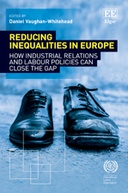Explore

Reducing Inequalities in Europe
0 Ungluers have
Faved this Work
Login to Fave
International debate has recently focused on increased inequalities and the adverse effects they may have on both social and economic developments. Income inequality, now at its highest level for the past half-century, may not only undermine the sustainability of European social policy but also put at risk Europe’s sustainable recovery. A common feature of recent reports on inequality (ILO, OECD, IMF, 2015–17) is their recognition that the causes emerge from mechanisms in the world of work. The purpose of this book is to investigate the possible role of industrial relations, and labour policies more generally, in reducing these inequalities.
The book pays particular attention to the contribution of social partners and social dialogue to achieving concrete outcomes, notably in terms of flexibility and security for both employers and workers. The key aim is to identify elements of a response to a number of important questions: which countries have succeeded in carrying out the necessary reforms without generating further inequalities? What industrial relations systems seem to perform better in this respect? What policy measures, institutions and actors play a determinant role in achieving more balanced outcomes? How can social dialogue address future transformations of the world of work while limiting inequalities?
The scope of this book goes beyond pay to address other types of inequality – in the distribution of working time, access or re-access to jobs, training and career opportunities, and social protection and pensions. It also looks at inequalities that may affect particular groups of workers, including women or young people, as well as people in certain types of work arrangements, such as part-time or temporary work or the self-employed.
This book is vital reading for anyone concerned with labour policy, industrial relations and social welfare but, above all, with how advances in these areas can contribute to the global fight against growing inequalities.
This book is included in DOAB.
Why read this book? Have your say.
You must be logged in to comment.
